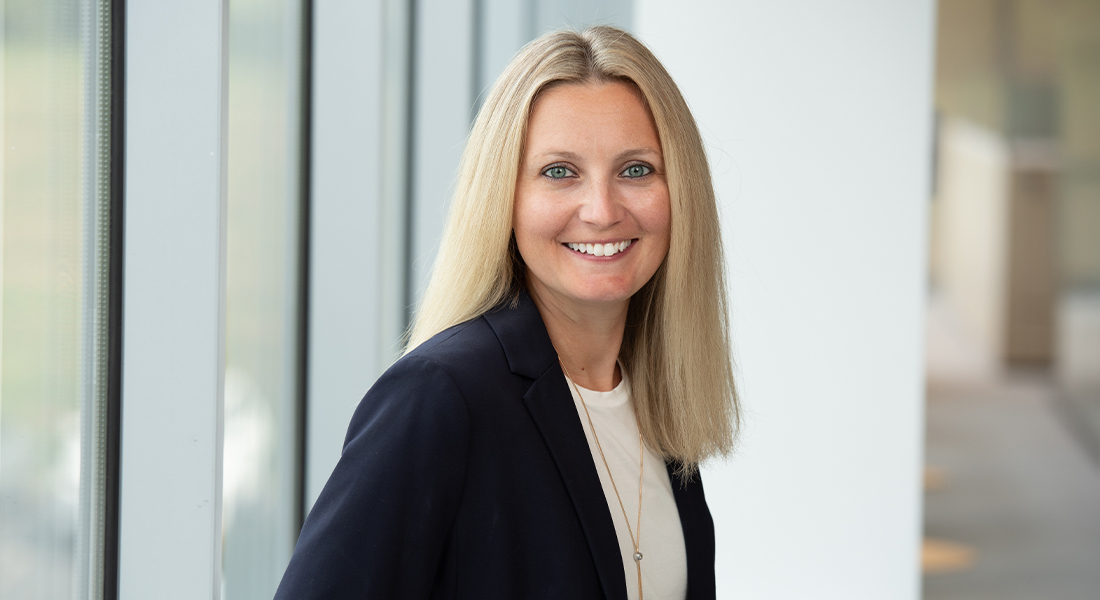
Spotlight on Blue Marble
Blue Marble is a for-profit social enterprise specializing in building climate resilience for vulnerable communities. It was established in 2015 as a collaborative initiative within...

Meghan DiBona, Aspen’s VP, Casualty Facultative Manager, started her career at Aspen as a graduate and quickly progressed. She discusses the importance of learning from others, the power of saying yes and why people at all stages of their career should focus on upskilling in an interview:
In my current role, I manage the Casualty Facultative portfolio at Aspen Re. I first joined Aspen through the Graduate Program in 2012. The Graduate Program spans two years, both of which I spent working closely with the Cas Fac team. At the end of the program, I became an Associate Underwriter. Over several years I strengthened my underwriting, negotiating, and relationship skills and elevated through the underwriting designations. In 2020, I was promoted to VP Underwriter and Manager of the Cas Fac portfolio.
I have been very fortunate to work with incredible people here at Aspen. For the first several years of my career, I underwrote alongside individuals who had been in the reinsurance industry for decades. I tried to absorb as much information as I could from them, whether it related to underwriting accounts, marketing tactics, relationship building, or negotiation skills. Succession planning was also essential in my growth at Aspen. The former Casualty Facultative Manager enabled me to work on projects and participate in meetings that I normally would not have had exposure to. When they then left Aspen, I felt confident that managing the portfolio was the natural next step for me.
There have been multiple people who have had a positive impact on my career. Informally, my mentors have provided me with valuable advice and guidance, and I find I’m now filling the same role with more junior colleagues. I recently volunteered to be a mentor in Aspen’s formal mentorship program, which I’m looking forward to taking part in. Senior leaders have also impacted my career – after I was promoted to the Casualty Facultative Manager role, I learned that there were at least three individuals in leadership positions that had advocated for me.
Aspen runs a program whereby nominated colleagues get an incredible opportunity to be sponsored by a member of the Executive Committee. I was fortunate enough to be one of these nominated by a senior leader and then selected to participate. I’m a massive advocate for learning from others and find informal mentorship or formal programs like the breakthrough program to be one of the best ways to reflect on your career and progress. I’m incredibly grateful for the support I’ve received so far throughout my career, and no doubt will continue to have.
I absolutely focus on continued learning opportunities. In my opinion, whether you’ve been in the industry for 2 years or 25 years, there are always skills you can improve upon and emerging risks to learn about. I’ve always focused on upskilling, whether that be on human skills or more technical skills. I think the most important continued learning opportunity has been focused on broadening my portfolio management skills.
As an individual risk underwriter for several years, I typically focused on profitability for each individual insured. I knew what our overall results were, but I didn’t focus on what was driving those results. This quickly changed once I managed the Cas Fac portfolio. I learned how to manage a book of business from a profitability standpoint through reserving deep dives and discussions with the pricing actuaries. Now, I am eager to explore the profitability of other business areas and understand how Aspen is reallocating capital to optimize results. Having a better understanding of Aspen’s results and future goals as an organization allows me to manage my portfolio more effectively as I deepen my understanding of how my team fits into the bigger picture.
Diversity of thought is essential in any sector, including the reinsurance space. Historically, the reinsurance industry has lacked diversity and although we’ve seen some improvement, there’s still much work to do. Diversity breeds creativity. Individuals of different genders, cultures, ethnicities, religions, and ages have different life experiences and ways of thinking. A diverse (re)insurance company will be able to provide their clients with innovative solutions for emerging risks. There will be multiple unique viewpoints and ideas contributing to problem solving which will drive better results. A diverse (re)insurance company will also attract and retain top industry talent as diversity helps build a strong community and culture.
My biggest piece of advice to aspiring graduates would be to say yes when you are presented with an opportunity you think you might be interested in. Whether the proposal is spending a rotation with another business unit, visiting a client you don’t have an existing relationship with, or a promotion or role you’re not quite sure if you’re ready for but you think you might be, say yes.
Having knowledge in multiple areas of the business will provide you with a solid foundation for your career. The (re)insurance industry is largely focused on relationships, so take advantage of chances to build new ones. If you have the determination and ability to continuously learn and develop, you may have the opportunity to grow into a promotion or position that you may not be certain you were ready for.
Read how Aspen prioritizes the ongoing professional development of our team in our latest Sustainability Report.
In my opinion, whether you’ve been in the industry for 2 years or 25 years, there are always skills you can improve upon and emerging risks to learn about.
Meghan DiBona VP, Casualty Facultative Manager